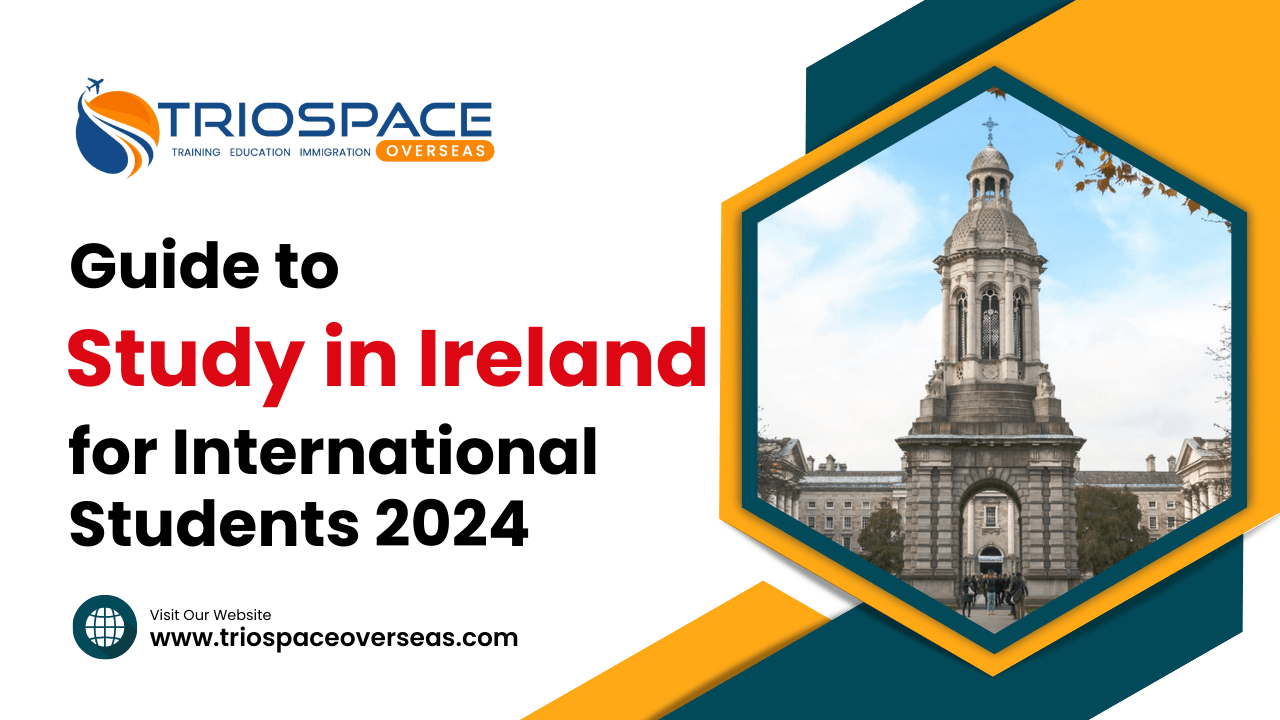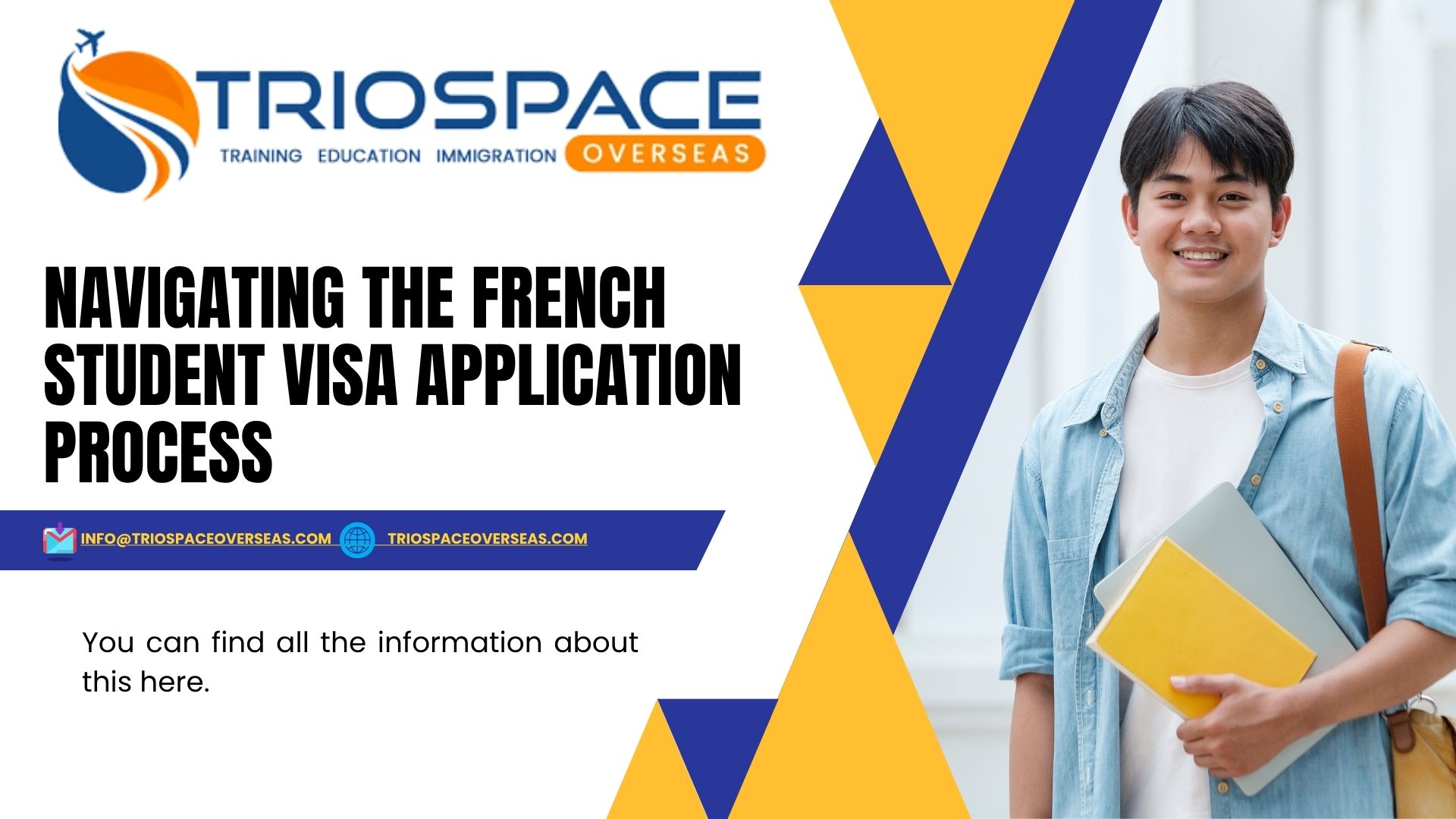
Guide to Study in Ireland for International Students 2024
Study in Ireland in 2024 provides a varied academic and cultural experience. Ireland is well-known for its high-quality education system, with a varied selection of courses and institutions to fit any academic interest. With a bustling student life and a welcoming environment, foreign students are immersed in a dynamic and supportive community. Planning your study trip includes choosing the correct course, knowing visa regulations, and researching lodging choices. Upon arrival, students may expect to discover a rich tapestry of Irish culture, as well as chances for travel and leisure activities. Language obstacles and cultural adjustment are addressed through solutions and support networks. Graduates depart with globally recognized qualifications and better professional opportunities, making Study in Ireland a worthwhile investment in their future.
Planning to study abroad, Looking for the best overseas education consultants in Hyderabad? Triospace Overseas offers several countries to study abroad like Study in USA, Study in UK, Study in CANADA, Study in AUSTRALIA, Study in GERMANY, Study in FRANCE, Study in IRELAND, Study in NEW ZEALAND, Etc…. Get a free counseling session with our expert counselors and get expert guidance on your profile.
Why Study in Ireland?
There are several strong reasons to study in Ireland:
Academic Excellence:
– Universities are highly ranked internationally, with globally recognized degrees.
– A strong emphasis on research, with students able to participate in cutting-edge initiatives.
Career prospects:
– The country’s strong economy and presence of global corporations prepare graduates for successful careers.
– Internships offer excellent job experience.
Affordability:
– Compared to other English-speaking nations, Ireland has a reduced cost of living and tuition costs, as well as scholarship options.
Safety and wellbeing:
– Ireland routinely ranks well on safety and well-being indexes, creating a secure and comfortable atmosphere for pupils.
English-speaking nations:
– Removes the language barrier for many overseas students, making it an accessible choice for pursuing academic goals.
Overall, Study in Ireland provides a distinct combination of academic achievement, cultural immersion, job opportunities, and a secure and hospitable atmosphere.
Plan Your Journey to Study in Ireland
Planning your journey to study in Ireland requires several crucial steps:
1. Research and Choose a Course: Check out the courses provided by Ireland universities for international students to study for master’s and bachelors. Consider your academic interests, career aspirations, and the quality of the programs available.
2. Research Institutions: Investigate different universities and colleges in Ireland. Consider the location, amenities, reputation, and student support services. Narrow your options depending on your tastes and priorities.
3. Review Admission Requirements: Examine the admission requirements for your preferred course and institution. This may include academic credentials, English language competency exams (such as IELTS or TOEFL Preparations), and any additional application papers or essays necessary.
4. Apply for Admission: Finish the application process for your preferred course and university. Keep application dates in mind and make sure you submit all required documents and information in detail.
5. Apply for Ireland Student Visa: Once you’ve received an admission offer, you can apply for a student visa to study in Ireland. Check the rules and processes for your specific nation of residence, and leave enough time for visa processing.
6. Arrange Accommodation: Look for lodging choices near your selected institution. This could include university accommodations, private rentals, or homestays. Secure your lodging well in advance to ensure availability.
7. Plan Your Finances: Estimate your tuition, accommodation, and living expenses. Look into scholarships, student loans, and financial aid possibilities to help pay for your study.
8. Prepare for Travel: Make travel plans to Ireland, such as booking flights and organizing transportation from the airport to your lodging. Familiarize oneself with Irish customs and travel regulations.
Application Process to Study in Ireland
The application process to study in Ireland, especially for international students aiming for a master’s degree, involves several essential steps to ensure a smooth transition to one of the best universities in Ireland.
1. Research and Selecting Universities:
Start by researching the best universities in Ireland for master’s programs, considering factors such as rankings, reputation, and program offerings. Institutions like Trinity College Dublin, University College Dublin, and University College Cork are among the top choices for international students. Explore their websites and program brochures to find the right fit for your academic and career goals.
2. Review Admission Requirements:
Each university and program may have specific admission requirements, so carefully review them before applying. Common requirements for international students include:
– Academic transcripts from previous education institutions
– Proof of English language proficiency (such as IELTS or TOEFL scores)
– Letters of recommendation
– Statement of purpose or personal statement
– Curriculum vitae (CV) or resume
3. Prepare and Submit Application Materials:
Gather all required documents and prepare your application materials according to the guidelines provided by your chosen universities. Pay close attention to deadlines, as late applications may not be considered. Complete the online application forms and upload supporting documents through the university’s admissions portal or application system.
4. Apply for Ireland Student Visa:
Once you receive an offer of admission from your chosen university, you will need to apply for a student visa to study in Ireland. Contact the nearest Irish embassy or consulate in your home country for information on visa requirements and the application process. You may need to provide documents such as:
– Passport
– Letter of acceptance from the university
– Proof of financial means to support yourself during your studies
– Health insurance coverage
– Visa application fee
5. Wait for Visa Approval:
After submitting your visa application, wait for it to be processed by the Irish authorities. It’s essential to apply well before your intended start date to allow sufficient time for processing. Once your visa is approved, you can make travel arrangements to Ireland and prepare for your academic journey.
Study in Ireland offers international students a world-class education in Ireland and a welcoming and vibrant environment. With top-ranking universities, diverse academic programs, and a rich cultural heritage, Ireland is an ideal destination for pursuing higher education. By following the application process outlined above and preparing thoroughly, you can embark on an enriching educational experience in Ireland.
Cost of Education to Study in Ireland
The cost of education to study in Ireland varies depending on several factors, including the type of program, the institution, and whether you are an EU or non-EU student. Here is a summary of the common expenses involved with Study in Ireland:
Tuition fees:
– Tuition fees vary by course and institution. Undergraduate programs for non-EU students typically cost between €10,000 and €25,000 per year.
– Postgraduate programs, including master’s degrees, often charge higher tuition costs, ranging from €10,000 to €35,000 per year, depending on the topic of study and institution.
Living expenses:
– Accommodation: Accommodation costs vary depending on whether you live on or off campus. On-campus housing costs between €4,000 and €8,000 per academic year, while off-campus rentals can range from €300 to €800 per month, depending on location and quality of residence.
– Food: The average monthly cost of shopping and dining out is between €250 and €350.
– Transportation: Public transportation expenses vary based on your location and usage, but normally range between €50 and €150 per month.
– Other expenses: Additional expenses, such as books, supplies, health insurance, and personal expenses, should be allocated annually, totaling around €3,000 to €5,000.
Visa and Administrative Fees:
– Non-EU students may be required to pay visa application fees, which vary according to the kind of visa and place of origin. Visa fees normally range between €60 and €100.
– Other administrative fees, such as application processing fees levied by colleges, may apply and should be factored into your budget.
Health insurance:
– Non-EU students must obtain private health insurance when Study in Ireland. The cost of health insurance can vary, but it normally runs between €500 and €1,000 per year.
When planning to study in Ireland, it is critical to properly budget and account for all expenses. International students should also look for scholarship opportunities, financial aid, and part-time jobs to help cover the cost of their education and living expenses.
Scholarships to Study in Ireland:
There are several Ireland scholarships available to help international students finance their studies in Ireland. Here are a few notable examples:
| Scholarship Name | Eligibility | Amount |
| Government of Ireland International Education Scholarships | Non-EU/EEA students pursuing full-time studies at participating universities | Full tuition fee waiver + €10,000 stipend |
| University College Dublin Global Excellence Scholarships | High-achieving international students for undergraduate and postgraduate programs | Up to 50% or 100% tuition fees |
| Trinity College Dublin Global Excellence Postgraduate Scholarships | High-achieving international students for postgraduate programs | Up to €5,000 – €20,000 |
| National University of Ireland, Galway (NUIG) Scholarships | International students with academic excellence for undergraduate and postgraduate programs | Varies depending on the scholarship |
| University College Cork (UCC) International Scholarships | International students with academic excellence for undergraduate and postgraduate programs | Varies depending on the scholarship |
| The Walsh Fellowships | International PhD students in humanities and social sciences | €24,000 EUR grant per year |
| Central Bank of Ireland Undergraduate Scholarships for International Students | High-achieving international students for undergraduate programs in business, economics, finance, or law | €29,500 EUR annually + benefits |
Please note: Eligibility criteria and award amounts can also change, so it’s important to visit the official scholarship websites for the latest information.
Here are some resources where you can find more scholarships:
- Education in Ireland: http://educationinireland.com/
- Study in Ireland: https://www.educationinireland.com/en/how-do-i-apply-/apply-for-a-course/undergraduate-courses/how-to-apply-undergraduate-eu.html
- University websites: Most universities in Ireland have dedicated scholarship pages on their websites.
And also know more about the Germany Scholarships for Indian Students
Student Visa for Ireland Application Requirements
To apply for a student visa to Ireland, you’ll need to fulfill certain requirements. Here’s an overview of the typical student visa application requirements:
1. Acceptance Letter: A letter of acceptance or offer from a recognized educational university in Ireland confirming that you have been accepted onto a course of study.
2. Proof of Financials: Evidence that you have sufficient funds to cover your tuition fees, living expenses, and other costs associated with studying and living in Ireland. This could include bank statements, scholarship awards, or sponsorship letters.
3. English Language Proficiency: Proof of your proficiency in the English language, typically through the submission of English language test scores such as IELTS, TOEFL, or PTE Academic. Some institutions may have specific language requirements.
4. Passport: A valid passport that will remain valid for the duration of your intended stay in Ireland, plus any additional validity required by Irish immigration authorities.
5. Visa Application Form: A completed visa application form, which can usually be obtained from the website of the Irish Naturalisation and Immigration Service (INIS) or the Irish embassy or consulate in your home country.
6. Passport-sized Photographs: Recent passport-sized photographs that meet the specifications outlined by Irish visa authorities.
7. Visa Application Fee: Payment of the applicable visa application fee, which may vary depending on your nationality and the type of visa you are applying for.
8. Health Insurance: Proof of comprehensive health insurance coverage for the duration of your stay in Ireland, which meets the requirements set by Irish immigration authorities.
9. Biometric Information: Some visa applicants may be required to provide biometric information, such as fingerprints, as part of the visa application process.
10. Additional Documentation: Depending on your individual circumstances and the requirements of the Irish embassy or consulate processing your visa application, you may be asked to provide additional documentation to support your application.
It’s important to note that visa requirements and application procedures may vary depending on your nationality and the specific circumstances of your application. Therefore, it’s recommended to check the official website of the Irish Naturalisation and Immigration Service (INIS) or consult with the Irish embassy or consulate in your home country for the most up-to-date information and guidance on applying for a student visa for Ireland.
Read more about in detail of Student Visa Application Process for USA in 2024
Post-Study Opportunities
Post-study opportunities for international students who have completed their studies in Ireland are abundant and diverse. Here are some of the key avenues available:
1. Employment Prospects: International graduates from Irish universities and colleges are highly sought after by employers globally. Many industries in Ireland, including technology, pharmaceuticals, finance, and healthcare, offer excellent career opportunities for skilled professionals. Graduates can explore job openings through online job portals, recruitment agencies, career fairs, and networking events.
2. Stay-back Options: Ireland offers a “Stay Back Option” for international students who have completed their studies. Under the Third Level Graduate Scheme, non-EU/EEA students who have graduated from Irish higher education institutions can remain in Ireland for up to 24 months to seek employment or start their own business.
3. Work Visa and Permits: International graduates who secure employment in Ireland may apply for a work visa or permit to legally work and reside in the country. The Irish government offers various work permit schemes, such as the Critical Skills Employment Permit and the General Employment Permit, to facilitate the employment of skilled workers in specific sectors.
4. Entrepreneurship and Startups: Ireland has a thriving startup ecosystem and offers support and resources for aspiring entrepreneurs. International graduates with innovative business ideas can explore opportunities to launch their own startups or join existing ventures through initiatives like Enterprise Ireland, Local Enterprise Offices, and startup accelerators.
5. Further Education and Research: Some international graduates may choose to pursue further education or research opportunities in Ireland. Postgraduate programs, doctoral studies, and research fellowships are available in various fields, allowing graduates to deepen their knowledge and expertise.
6. Networking and Professional Development: Building a strong professional network is essential for career advancement. International graduates can leverage alumni networks, industry associations, and professional organizations to connect with peers, mentors, and potential employers, enhancing their career prospects.
7. Return to Home Country: International graduates may also choose to return to their home country or region armed with valuable skills, knowledge, and international experience gained from Study in Ireland. They can contribute to the development of their home country’s economy, society, and workforce while maintaining connections with Ireland through alumni networks and professional associations.
Overall, post-study opportunities for international graduates in Ireland are diverse and promising, offering pathways for career advancement, entrepreneurship, further education, and professional development. By leveraging their education, skills, and networks, graduates can embark on fulfilling and successful careers in Ireland or beyond.
FAQs
1. Can international students work in Ireland after completing their studies?
Yes, international students who have completed their studies in Ireland may be eligible to work in the country under the Third Level Graduate Scheme. This scheme allows non-EU/EEA students to remain in Ireland for up to 24 months to seek employment or start their own business.
2. How can international graduates secure a work visa or permit in Ireland?
International graduates who secure employment in Ireland may apply for a work visa or permit to legally work and reside in the country. There are several work permit schemes available, such as the Critical Skills Employment Permit and the General Employment Permit, which cater to different skill levels and sectors.
3. Are there opportunities for international graduates to start their businesses in Ireland?
Yes, Ireland has a thriving startup ecosystem and offers support and resources for aspiring entrepreneurs. International graduates with innovative business ideas can explore opportunities to launch their startups or join existing ventures through initiatives like Enterprise Ireland, Local Enterprise Offices, and startup accelerators.



















